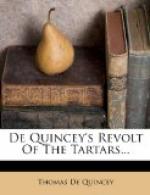attempt a feeble retaliation, react upon the unfortunate
Kalmucks. At this crisis, it is probable that
envy and wounded pride, upon witnessing the splendid
victories of Oubacha and Momotbacha over the
15 Turks and Bashkirs, contributed strength
to the Russian irritation. And it must have been
through the intrigues of those nobles about her person
who chiefly smarted under these feelings that the
Czarina could ever have lent herself to the unwise
and ungrateful policy pursued 20 at this
critical period toward the Kalmuck Khan. That
Czarina was no longer Elizabeth Petrowna; it was Catharine
II.—a princess who did not often err so
injuriously (injuriously for herself as much as for
others) in the measures of her government. She
had soon ample reason for 25 repenting
of her false policy. Meantime, how much it must
have co-operated with the other motives previously
acting upon Oubacha in sustaining his determination
to revolt, and how powerfully it must have assisted
the efforts of all the Tartar chieftains in preparing
the minds of their 30 people to feel the necessity
of this difficult enterprise, by arming their pride
and their suspicions against the Russian Government,
through the keenness of their sympathy with the wrongs
of their insulted prince, may be readily imagined.
It is a fact, and it has been confessed by candid
Russians themselves when treating of this great dismemberment,
that the conduct of the Russian Cabinet throughout
the period of suspense, and during the crisis of hesitation
in the Kalmuck Council, was exactly such
5 as was most desirable for the purposes of the
conspirators; it was such, in fact, as to set the
seal to all their machinations, by supplying distinct
evidences and official vouchers for what could otherwise
have been at the most matters of doubtful suspicion
and indirect presumption. 10
Nevertheless, in the face of all these arguments,
and even allowing their weight so far as not at all
to deny the injustice or the impolicy of the imperial
ministers, it is contended by many persons who have
reviewed the affair with a command of all the documents
bearing on the case, 15 more especially
the letters or minutes of council subsequently discovered
in the handwriting of Zebek-Dorchi, and the important
evidence of the Russian captive, Weseloff, who was
carried off by the Kalmucks in their flight, that
beyond all doubt Oubacha was powerless for any
20 purpose of impeding or even of delaying
the revolt. He himself, indeed, was under religious
obligations of the most terrific solemnity never to
flinch from the enterprise or even to slacken in his
zeal; for Zebek-Dorchi, distrusting the firmness of
his resolution under any unusual
25 pressure of alarm or difficulty, had, in the very
earliest stage of the conspiracy, availed himself
of the Khan’s well-known superstition, to engage
him, by means of previous concert with the priests




